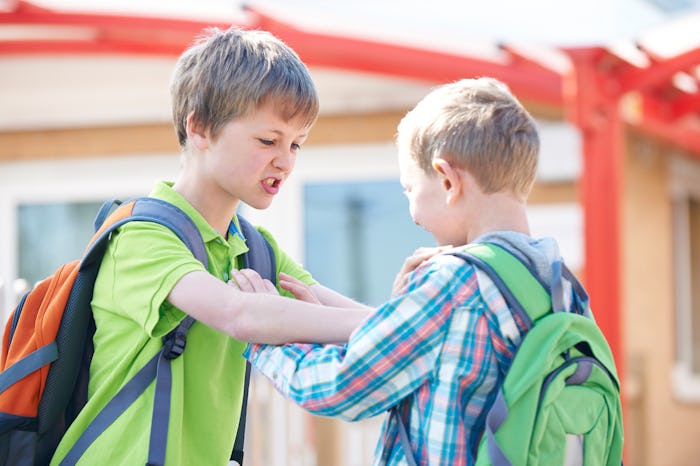Life

What To Do If Your Child Is A Bully, Because It Can Happen
Parenting isn't easy. If you haven't had the pleasure of rearing children yourself just yet, go ahead and ask a parent you know. They'll be sure to tell you, it's tough work. At the end of the day, parents can only hope to raise kind children. In today's day and age, however, that's not always that easy. Although nobody seeks out to raise a bully, but sometimes it happens. If you're struggling with a child who may be a bully, you need to know what to do if your child is a bully.
With the rise of technology and negativity in the outside world, it's easy for kids to get lost along the way.It doesn't mean that you're a bad parent, or that you're raising a bad kid. It just means that it's time for you to hone in on what to do if your child is a bully. Because bullies exist, and some of the biggest bullies I've ever known have come from parents who are the kindest people in the world.
Though every bully has their reasons, as a parent, it's important to pay attention and read the signs in order to nip your bully in the bud as soon as possible. Read on for what to do if your child is a bully.
1Find Out What Happened
Though your initial instinct might be to get angry at your child for what's happened, bullying expert and psychologist Joel Haber told PBS that parents need to keep their cool, and find out what happened. Haber said that asking your child to tell you in their own words what happened and what their role was in the incident, opens the floor up for them to explain their side of the story. However, Haber urged parents to be firm with their children, and insist on hearing how their child was involved, and not any other children involved.th
2Focus On Consequences
Once you've heard the extent of your child's involvement, from their own mouths as well as other, you should help your child understand that they are accountable for their actions, according to Jennifer Cannon, a family therapist in Newport Beach, California. "Outline and follow through with consequences for bullying behavior. Write them out, review them once a week, and enforce them," Cannon told Parents. Whether it's taking away television, games, or social activity, use your best judgment in what sort of consequences you want to instill, and stick to them.
3Encourage Empathy
According to Haber, encouraging empathy from your child will help them to understand that what they did was wrong, and how it would feel if they were treated the way they've been treating others. "The earlier we can help kids develop empathy, the better chance we have of them not becoming a bully," Haber told PBS.
4Hold Your Child Accountable
"Parents must hold their child accountable," Rosalind Wiseman, author of Queen Bees and Wannabees told Care. "Even if the child feels he was provoked. Ask your child if any part of what the school or other parent said is true." Aside from being an author, Wiseman developed a bullying curriculum used nationwide by teachers and administrators, so she knows a thing or two about how to hold your kid accountable. Don't let them off the hook, or they're likely to repeat the behavior in the future.
5Find The Source Behind The Bullying
Carrie Paul, a former guidance counselor in a New York City elementary school, told Care that parents should try and find the source of their child's anger. Whether it's an incident that happened at school, or something that happened at home, there's almost always something behind your child's bullying. Getting to the bottom of it will help you better understand how you can help your child.
6Involve The School
According to Ben Leichtling, psychologist and author of Parenting Bully-Proof Kids, you want to involve the school in any incidents that happen with your child. "Tell the guidance counselors and the teachers that you don’t support bullying and you want to know if it occurs,” Leichtling told PBS. Because you can't keep your eye on your kid when they're at school, enlisting the help of your kid's school will help you combat any further incidents.
7Don't Justify Their Behavior
Don't justify your child's behavior, Rosalind told Care. Though it's easy to want to protect your child, to believe that they're not capable of bullying another child, justifying their behavior won't help the problem. Rather than denying what happened, or trying to find an excuse for your child, ask them to take ownership of what they've done.
8Be A Role Model
Barbara Coloroso, author of The Bully, the Bullied, and the Bystander, told PBS that you should be a role model for your child to phase out the bully stage. “If your kid is truly the bully, you have to examine what’s going on in your own home.” If you're exhibiting bullying behavior in your own home, the chance of your child picking up on that is exponentially higher than if you treat everyone in your home with respect.
9Don't Blame Yourself
Whatever you do, don't blame yourself for your child's bullying. Though it's important to take a look at what's happening inside your own home, don't blame yourself. You're still a good parent. If your child is acting out, or being a bully, it's not because you're neglecting your child, or because you're irresponsible. So instead if beating yourself up, focus on what you can do to get to the bottom of your child's behavior, rather than focusing on your own.